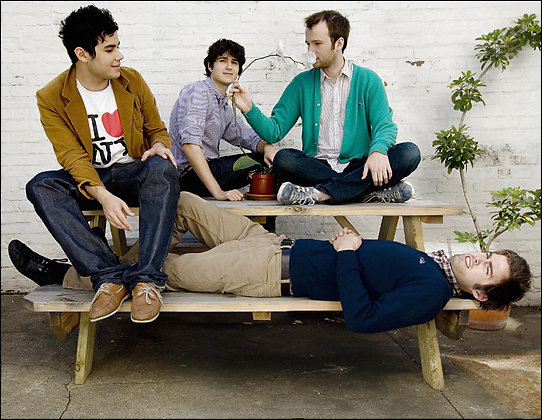
By Arye Dworken
Ask Vampire Weekend vocalist Ezra Koenig what he wants to do with his newfound life as New York’s Next Big Thing and he’ll simply say, “Write catchy songs.” Nothing more, nothing less. So, what’s all the fuss about Koenig’s band among blogs, message boards and, soon, magazine covers? Why is this seemingly innocuous group separating listeners into love or hate camps with barely a compromise in sight?
In truth, I can’t answer that question objectively because I am on the pro-VW side, declaring their self-titled LP a terrific straight-outta’-NYC debut on par with the Strokes’ Is This It? and the LCD Soundsystem album with “Losing My Edge” on it. Yes, there are echoes of Paul Simon and the Talking Heads; however, the record still sounds distinct enough to stand up against the group’s self-proclaimed “Upper West Side Soweto” approach. self-titled sat down with Koenig at the Fairway Café to find out why so many bloggers are out for blood
Where did you grow up?
Glen Ridge, New Jersey, in Essex County. There were some really great record stores in the next town. There was one store that specialized in punk, one in industrial metal. You don’t have places like that in New York.
You’re drinking your coffee black. That’s quite grown up. How old are you?
Twenty-three.
What did you study in Columbia University?
I majored in English Lit. I wasn’t much of a reader growing up but when I got to college, I got into this thing of always reading a book.
A favorite writer?
Kipling. I would have to say Kipling.
You still live on the Upper West Side. Why? Shouldn’t a musician live in Brooklyn?
I think that people have little understanding of what the Upper West Side is like. It’s incredibly rich in culture and intellectualism. I lived in Brooklyn for a while–Bedford Stuyvesant–but that’s because I was teaching there at the time.
You were a teacher?
Yeah, I did Teach For America for a year. I knew that I didn’t want to be a teacher as a career but the organization promotes this message that you can really make a difference and I got into that idea. I’ve heard some criticisms that you really have to spend more than two years as a teacher to do it well. And I hear that. This particular school I taught in seemed pretty fucked up and it was a serious eye-opening experience for me. I was hoping to do something beneficial and rewarding and that was definitely it.
Did you start the band during this time?
We formed Vampire Weekend during my last semester in college. We’ve known each other for a pretty long time and worked on various projects together.
How did a conventional Jersey boy studying in Columbia get exposed to Afropop?
Well, we all listen to so many different kinds of music. I guess we never thought of it as unusual kinds of music–we grew up with people around us listening to exotic or world music. My parents grew up in the ’60s and they were pretty liberal so we were exposed to multiculturalism.
For your first record, you avoided using an outside producer. Instead your keyboardist produced the record.
Well, it wasn’t intentional to use him. He started producing the songs from the beginning and if anyone else would try to mix it after that, we would really hate it. We like having the control, someone from the band who has a shared vocabulary, who understands what we want to accomplish. Having a producer from outside the band means that they have a certain sound that they bring from record-to-record. Its their aesthetic that they’re bringing and not necessarily ours. In retrospect, we’re happy that we avoided that.
What’s your awareness of the reactions to your band?
It’s been somewhat tough because with one Google search, you can read stuff that’s [so] over-the-top praiseworthy that it’s almost embarrassing. But then there’s the weird backlash, which seems based on not knowing us. And if I could just sit down with those people and talk to them, I think they would understand what we’re doing.
Here’s the strange thing: We’re just making pop songs. Sure, they can be exciting but they can’t change the world. So why get so worked up over a catchy song? At the end of the day, we’re incredibly lucky to get any feedback, though. People are talking about our band and most of the writers I respect are saying good things so maybe you have to phase out the negative talk.
What seems the most unjust criticism?
Whether we’ve fulfilled a certain expectation of hype. I think that’s really not fair to us. Who set this standard that we have to meet? Where did that come from? We never said anything about being, ya know, the next Beatles or something lofty like that.
One of my favorite lines on the record is “spilling kefir on your kafiya.” Referencing the kafiya feels so Urban Outfitters to me.
I have strange feelings about that fashion choice. People should be informed about what they’re wearing. When I first saw people wearing kafiyas, I assumed they were aware of the Middle East situation and the implications of those scarves. I found out that that wasn’t the case. I mean, I wouldn’t wear an Israeli Army T-shirt because of the implications. But especially when the kafiyas showed up in Urban Outfitters, it really became a fashion co-opting and that felt weird.
What about the inherent WASP-iness of your band’s music: the aesthetic, the references to Cape Cod, all these names–Walcott, Bryn, Blake.
I went to Cape Cod as child. But it was a very laid back experience. It wasn’t fancy mansions and cocktail parties. I had some really fun times there as a child so it influenced the song. But I found it bizarre that our record would be associated with privileged WASP-iness because, really, none of us are WASPs. And regarding our fashion choices : we like preppy clothes. We’re not being ironic or making a joke out of it. It just looks really American. I mean, this is normal clothing that everyone has. I would even call this “anti-fashion.” I like collared shoes. I like boat shoes. Why should we have to wear tight leather jackets and vintage jeans? That’s kinda lazy.
Are you nervous about the album selling especially considering the fact that it’s leaked?
Well nowadays, I don’t think any musician expects to sell ‘well.’ And we can’t expect to sell as many albums as bands used to but I think it’ll still do all right. Having a release is still important though. It’s nice to have a release date–even though the album has been circulating, having a day devoted to the release of it so people can talk about it … I think that’s like the old times.
What’s your audience like?
I was definitely surprised that the audience is as diverse as it is. But our success and our appeal is that we’re purposely not making music that could be confused with emo or hard rock. We’re trying to make catchy music. Music that’s as unhipstery as possible. None of us feel hipstery–although, that’s subjective–we feel so detached from the outdated indie rock mindset. I would be disappointed if someone said we were making indie rock.
Pitchfork gave your record a great review but positioned it as a divisive record.
To be honest, I was a little concerned with how they would receive that record. We’re concerned that people would misinterpret our music as irony. Based off Pitchfork’s writing in the past, we felt that they would accuse us of that. But we got a really positive review and I was really surprised. And pleased. They were also unafraid to say that they liked the record even though it wasn’t qualified as taste-making.
Why not title the record?
Initially we were going to title it Cape Cod Kwassa Kwassa but we ditched that once we saw everyone referencing it in stories. Like it became an easy identifier for us. Titling the album with that would have made it even harder to escape than it already is.
What’s the plan now?
We’ll be touring a lot but we’re also writing new music. We have some nuggets that we’re working on. We’d love to release another record as soon as possible. As soon as it makes sense.
